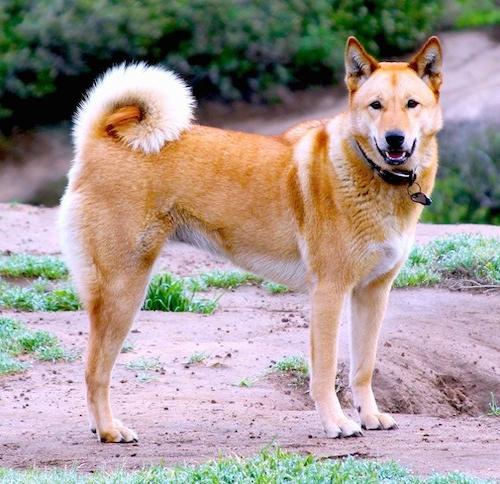- Breed Category: Spitz
- Country of Origin: South Korea
- Average Height: Males 50-55 cm, Females 45-50 cm
- Average Weight: Males 18-23 kg, Females 15-19 kg
- Average Life Span: 12-15 years
- Grooming Requirements: Moderate, regular brushing needed
- Exercise Requirements: High, needs daily exercise
- Coat Type: Double coat
- Coat Color Variations: White, black, tan, brindle
- Shedding Level: Moderate to high
- Ear Type: Erect
- Tail Type: Curled over back
- Temperament: Loyal, independent, alert
- Intelligence Level: High
- Barking Tendency: Low to moderate
- Compatibility with Children: Good with proper socialisation
- Compatibility with Other Pets: May be aloof, needs socialisation
- Training Ease: Moderate, requires consistent training
- Common Health Issues: Hip dysplasia, hypothyroidism
- Dietary Needs: High-quality dog food recommended
- Energy Level: High
- Drooling Tendency: Low
- Sensitivity to Weather: Tolerates cold well
- Overall Maintenance Level: Moderate
- Original Purpose: Hunting and guarding
- Year of Recognition by Kennel Clubs: 2008 (AKC Foundation Stock)
- Apartment Friendly: Not ideal, needs space
- Best Suited For: Active families, experienced owners
- Cost of Ownership: Moderate
- Unique Traits: Strong prey drive, loyal nature
- Cultural Significance: National treasure of South Korea
Imagine a dog that’s not just a pet but a piece of living history. The Jindo dog, with its striking appearance and loyal nature, is exactly that. Originating from Jindo Island in South Korea, this breed has been cherished for centuries for its intelligence and hunting prowess. But what makes the Jindo truly special? This article dives into the breed’s unique characteristics, rich history, and essential care tips.
The Jindo dog is known for its independence and strong bond with its owner. These dogs are not just beautiful; they’re also incredibly smart and agile. Understanding their background and needs is key to ensuring they thrive in your home. Let’s explore what makes the Jindo a remarkable companion.
The Jindo Dog: A Glimpse into Its Heritage and Characteristics
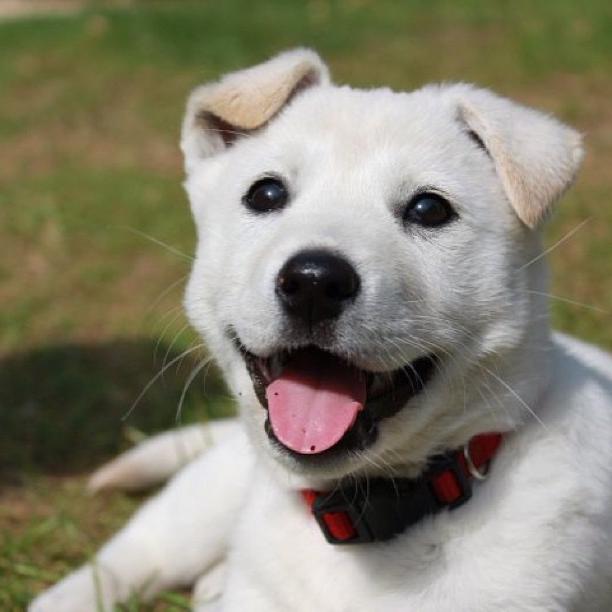
Early Development of the Breed
The Jindo dog has a fascinating history that dates back to ancient times on Jindo Island, South Korea. This breed developed in relative isolation, which helped preserve its unique traits. Over generations, Jindos were honed for their hunting skills, becoming adept at tracking and capturing game. Their natural instincts and intelligence were key to their survival and success.
Role in Korean Culture and History
In Korea, the Jindo is more than just a dog; it’s a cultural icon. Revered for its loyalty and bravery, the breed has been a symbol of national pride. Jindos have been celebrated in folklore and are often seen as guardians of the home. Their role in Korean culture is deeply rooted, reflecting the values of courage and fidelity.
Key Historical Figures and Events
Throughout history, Jindos have been associated with notable figures and events. During the Korean War, these dogs were known for their unwavering loyalty, often staying by their owners’ sides through thick and thin. Their reputation for bravery has only grown over time, cementing their place in Korean history.
Physical Characteristics
Jindos are medium-sized dogs with a well-proportioned build. They have a double coat that can be red, white, black, or tan, providing protection against harsh weather. Their pointed ears and curled tail give them a distinctive look, while their alert eyes reflect their intelligence and curiosity. Agile and strong, Jindos are built for endurance and speed, making them excellent companions for active individuals.
Appearance and Unique Traits
Jindos are medium-sized dogs, typically weighing between 15 to 23 kilograms. Their double coat is not just for show; it comes in a variety of colours like red, white, black, and tan, offering protection against the elements. The coat is dense and plush, giving them a regal appearance. Their pointed ears and curled tail are distinctive features that set them apart from other breeds. But it’s their eyes that truly captivate—sharp and alert, they seem to miss nothing.
Agility and Alertness
These dogs are built for action. Their agility is impressive, making them excellent at navigating various terrains. Whether it’s a quick sprint or a long-distance run, Jindos handle it with ease. Their alertness is another standout trait. Always on the lookout, they’re quick to respond to any changes in their environment, making them excellent watchdogs.
Temperament and Behaviour
Jindos are known for their independence and strong-willed nature. They form deep bonds with their families, often showing a level of loyalty that’s hard to match. While they can be reserved with strangers, they are affectionate and protective with those they trust. Training requires patience and consistency, but their intelligence makes them quick learners. They thrive in environments where they have a job to do, whether it’s guarding the home or accompanying you on outdoor adventures.
Personality Traits and Suitability as a Family Pet

Typical Personality Traits
Jindos are renowned for their loyalty, intelligence, and independence. These dogs are fiercely devoted to their families, often forming strong bonds that last a lifetime. Their intelligence is evident in their quick learning abilities and problem-solving skills. However, their independent nature means they can be a bit stubborn, requiring a firm yet gentle hand in training.
Suitability as a Family Pet and Guard Dog
As family pets, Jindos are both loving and protective. They are naturally wary of strangers, making them excellent guard dogs. Their alertness ensures they are always on the lookout, ready to alert their owners to any unusual activity. While they are protective, they are also gentle with their family members, making them a great addition to households that can provide the attention and exercise they need.
Interaction with Children and Other Animals
Jindos generally do well with children, especially if they are raised together. Their protective nature extends to the younger members of the family, but supervision is always recommended. When it comes to other animals, early socialisation is key. Jindos have a strong prey drive, so introducing them to other pets at a young age can help them coexist peacefully.
Training and Exercise Needs
Training a Jindo requires patience and consistency. Their intelligence makes them quick learners, but their independent streak can be a challenge. Positive reinforcement techniques work best. Regular exercise is crucial for this active breed. Long walks, runs, and playtime in a secure area will keep them happy and healthy. A bored Jindo can become destructive, so mental stimulation is just as important as physical activity.
Training, Exercise, and Health of the Jindo Dog

Importance of Early Training and Socialisation
Getting a Jindo off to a good start with early training and socialisation is crucial. These dogs are naturally independent and can be a bit stubborn, so introducing them to various environments, people, and other animals early on helps them become well-rounded adults. This early exposure reduces the risk of behavioural issues and ensures they grow into confident companions.
Recommended Training Techniques
When it comes to training, patience and consistency are key. Jindos respond well to positive reinforcement techniques, such as treats and praise. Avoid harsh methods, as they can be counterproductive. Short, engaging training sessions work best, keeping the dog interested and eager to learn.
Daily Exercise Requirements and Activities They Enjoy
Jindos are active dogs that need plenty of exercise to stay happy and healthy. Daily walks, runs, and playtime in a secure area are essential. They love activities that challenge their agility and intelligence, like fetch or obstacle courses. Keeping them physically and mentally stimulated prevents boredom and destructive behaviour.
Health and Lifespan
Jindos are generally healthy dogs with a lifespan of around 12 to 15 years. Regular vet check-ups, a balanced diet, and proper exercise contribute to their longevity. While they are robust, it’s important to watch for common issues like hip dysplasia and allergies. Early detection and care can make a big difference in their quality of life.
Health and Care for the Jindo Dog
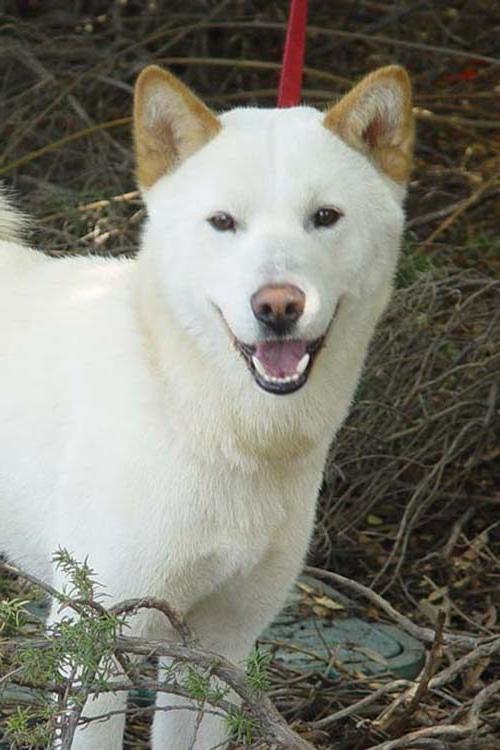
Common Health Issues
Jindos are generally healthy, but like any breed, they can be prone to certain health issues. Hip dysplasia and allergies are among the most common concerns. Regular vet visits can help catch these early, ensuring your Jindo stays in top shape.
Average Lifespan and Health Tips
With proper care, Jindos typically live between 12 to 15 years. To keep them healthy, provide a balanced diet and ensure they get plenty of exercise. Regular check-ups and vaccinations are essential to catch any potential issues early.
Preventative Care Recommendations
Preventative care is key to a long, healthy life for your Jindo. Regular dental care, flea and tick prevention, and maintaining a healthy weight are all important. Consider annual blood tests to monitor their overall health.
Grooming and Maintenance
Jindos have a double coat that requires regular grooming to keep it in good condition. Weekly brushing helps reduce shedding and keeps their coat looking its best. During shedding seasons, more frequent brushing may be necessary. Regular nail trims and ear checks should also be part of their grooming routine.
Coat Care and Grooming Routines for Jindo Dogs
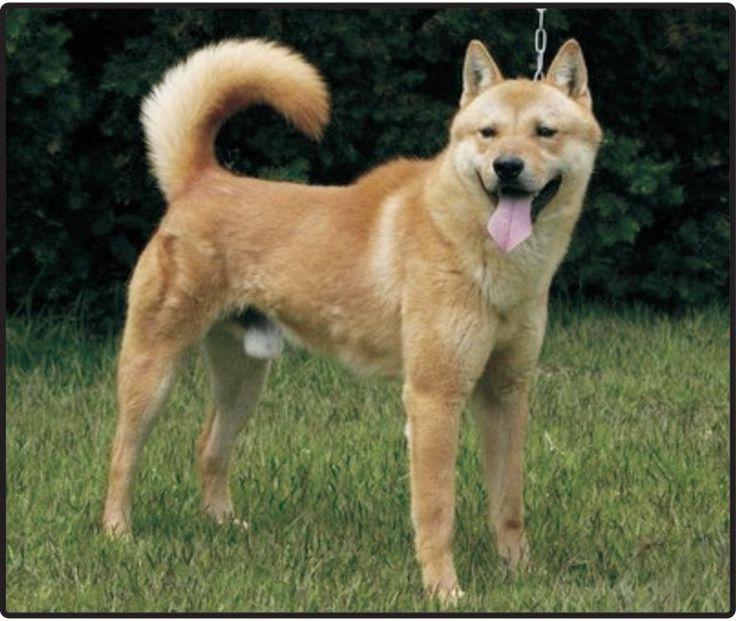
Shedding and Seasonal Grooming Tips
Jindos have a beautiful double coat that requires regular attention. Weekly brushing is a must to keep their coat healthy and reduce shedding. During shedding seasons, which typically occur twice a year, you might need to brush them more frequently. This helps manage the extra fur and keeps your home a bit tidier. A slicker brush or a deshedding tool can be particularly effective during these times.
Diet and Nutrition
A balanced diet is crucial for a Jindo’s overall health and well-being. High-quality dog food that meets their nutritional needs is essential. Look for options rich in protein and healthy fats to support their active lifestyle. Fresh water should always be available. Some Jindos may have food sensitivities, so it’s important to monitor their reactions to different foods and consult with a vet if you notice any issues. Treats can be used for training but should be given in moderation to maintain a healthy weight.
Nutritional Needs and Feeding Tips for Jindo Dogs

Nutritional Needs for Optimal Health
Jindos thrive on a diet rich in protein and healthy fats. These nutrients support their active lifestyle and maintain their muscular build. Opt for high-quality dog food that lists meat as the first ingredient. Omega-3 and Omega-6 fatty acids are also beneficial for their coat and skin health.
Foods to Include and Avoid
Include lean meats, fish, and vegetables in their diet. Avoid foods with artificial additives, fillers, and excessive grains, as these can lead to allergies or digestive issues. Some Jindos may have specific food sensitivities, so it’s wise to introduce new foods gradually and monitor their reactions.
Feeding Schedules and Portion Recommendations
Feed adult Jindos twice a day to maintain their energy levels. Puppies may require more frequent meals. Portion sizes depend on their age, weight, and activity level, so consult your vet for tailored advice. Always provide fresh water.
Fun Facts and Trivia
Did you know that Jindos are known for their incredible homing instinct? There are stories of Jindos travelling long distances to return to their owners. This breed is also recognised as a national treasure in South Korea, highlighting their cultural significance.
Interesting Tidbits about the Jindo Dog Breed

Famous Jindo Dogs in Media and History
Jindo dogs have made their mark not just in history but also in popular culture. One of the most famous Jindos is Baekgu, a dog that became a national hero in South Korea. Baekgu was known for his incredible loyalty, having travelled over 300 kilometres to return to his original owner after being sold. This remarkable journey captured the hearts of many and highlighted the breed’s legendary homing instinct.
In media, Jindos have appeared in various Korean films and TV shows, often portrayed as loyal and intelligent companions. Their striking appearance and unique traits make them a favourite choice for roles that require a dog with a strong presence and character.
These stories and appearances have helped cement the Jindo’s reputation as a dog of remarkable loyalty and intelligence, further enhancing their status as a beloved breed both in Korea and around the world.
Final Thoughts
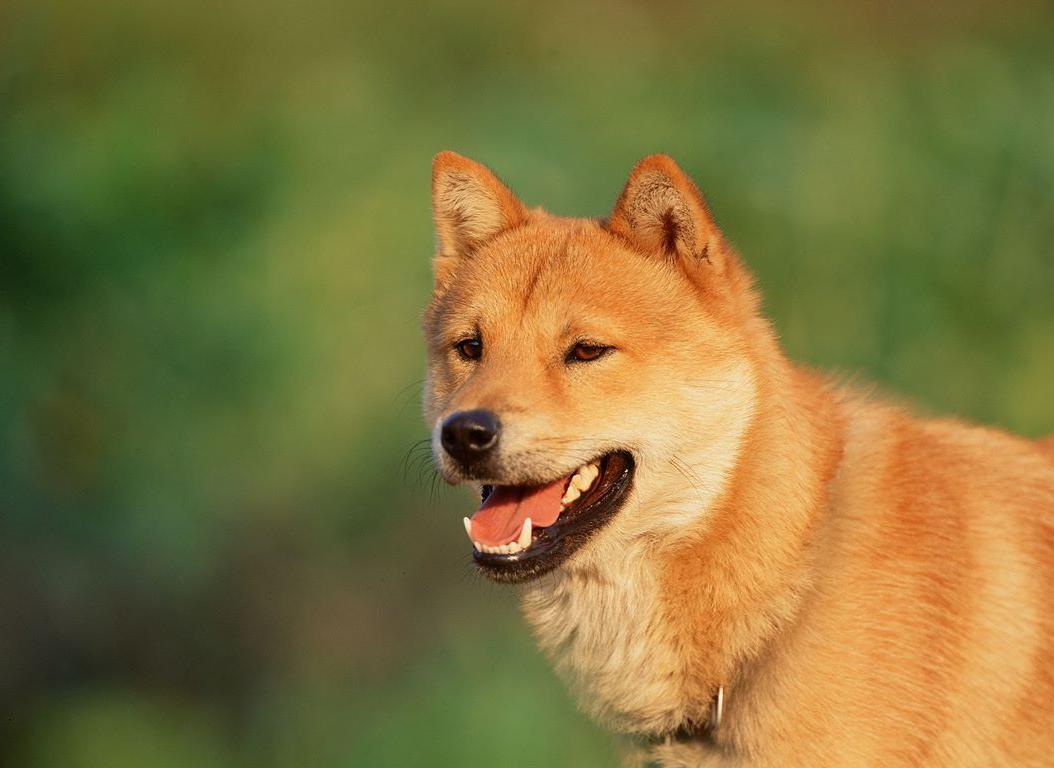
The Jindo dog is a symbol of loyalty and intelligence. This breed’s rich history and unique traits make it a cherished companion. While their independent nature presents training challenges, the rewards of their companionship are immense. Embracing a Jindo means welcoming a piece of Korean heritage into your home, with all the cultural significance and devotion they bring. For those ready to meet their needs, Jindos offer a lifetime of loyalty and adventure.
